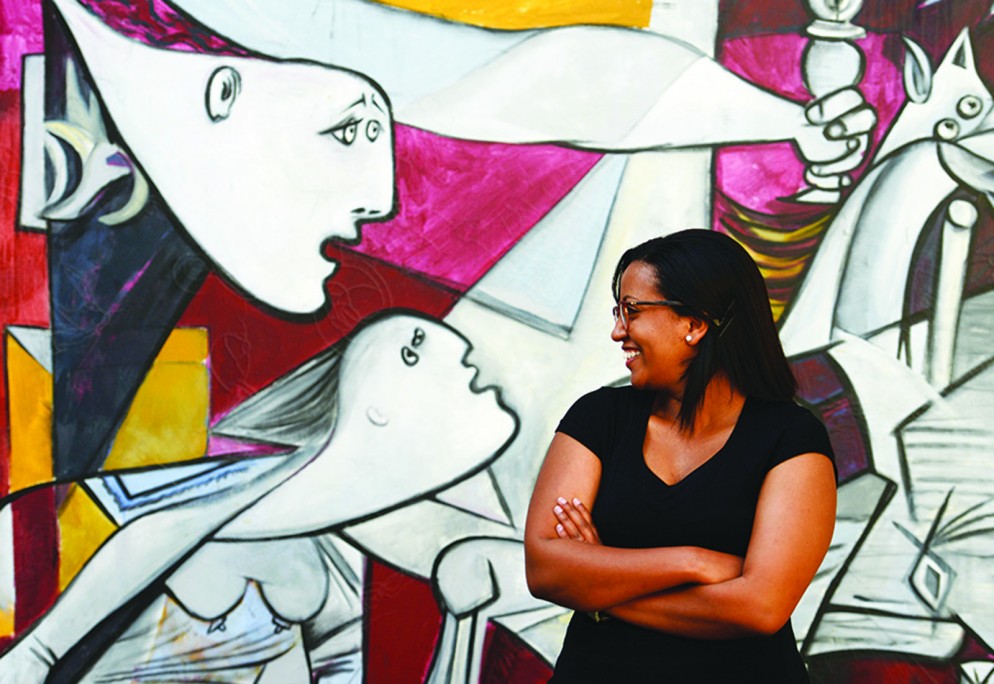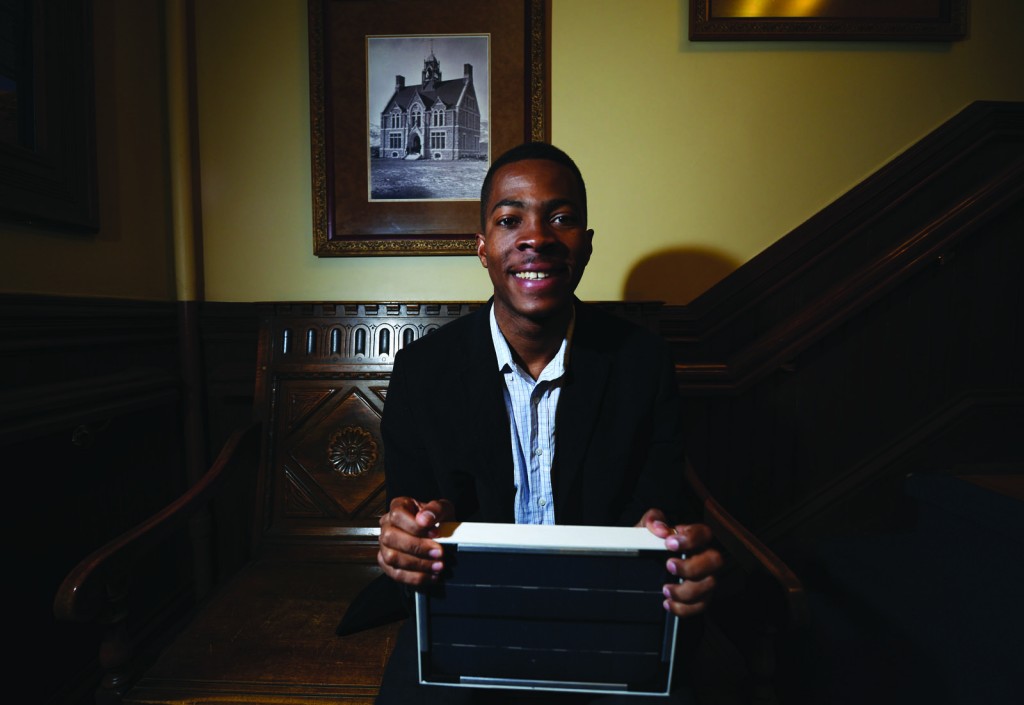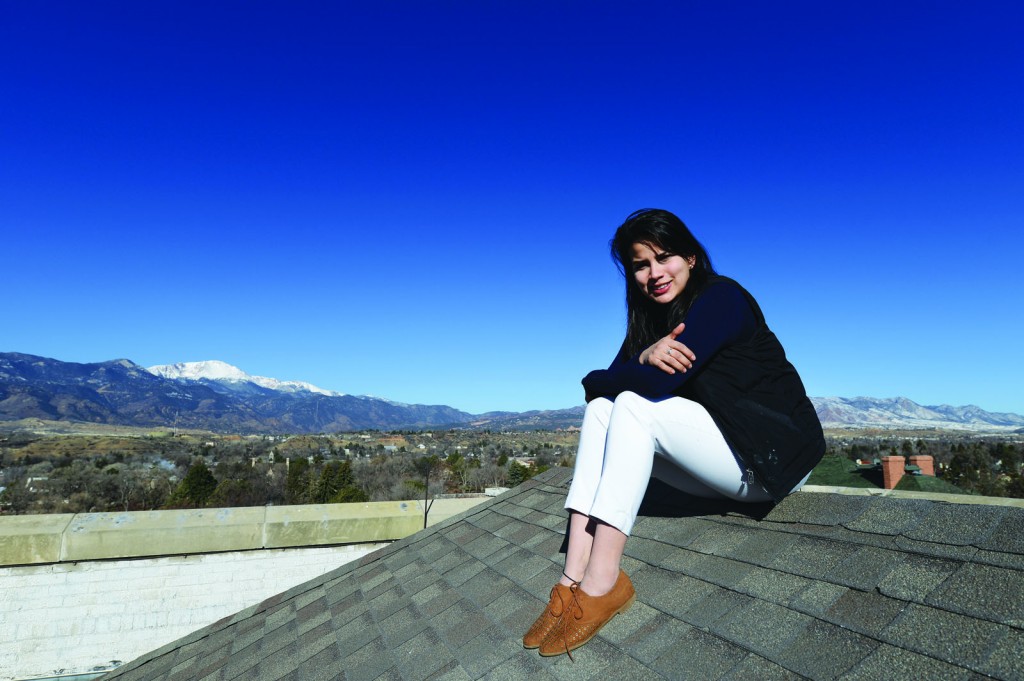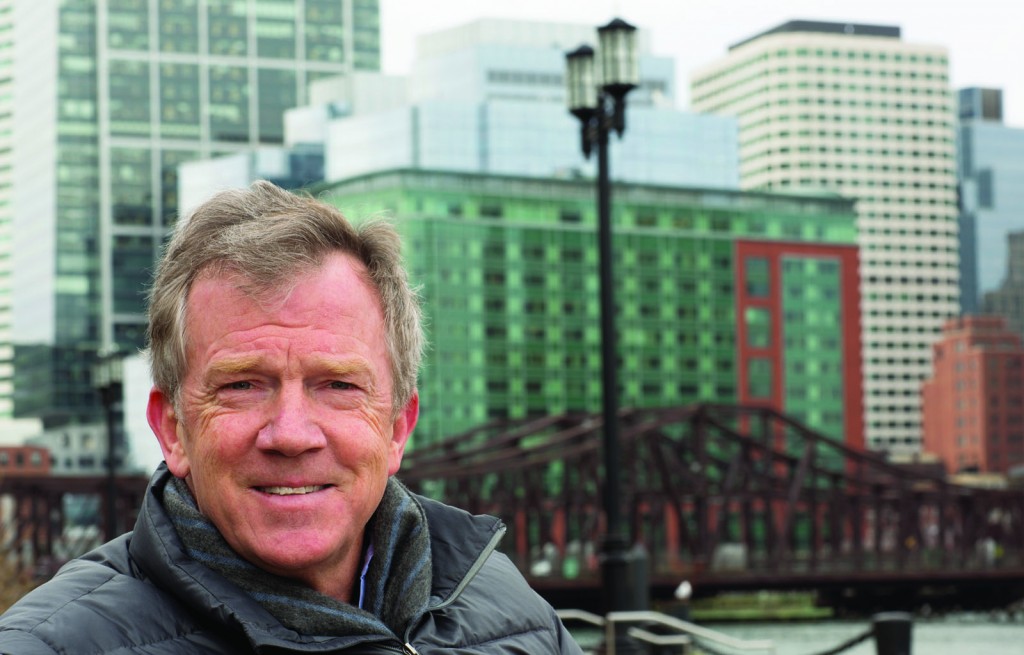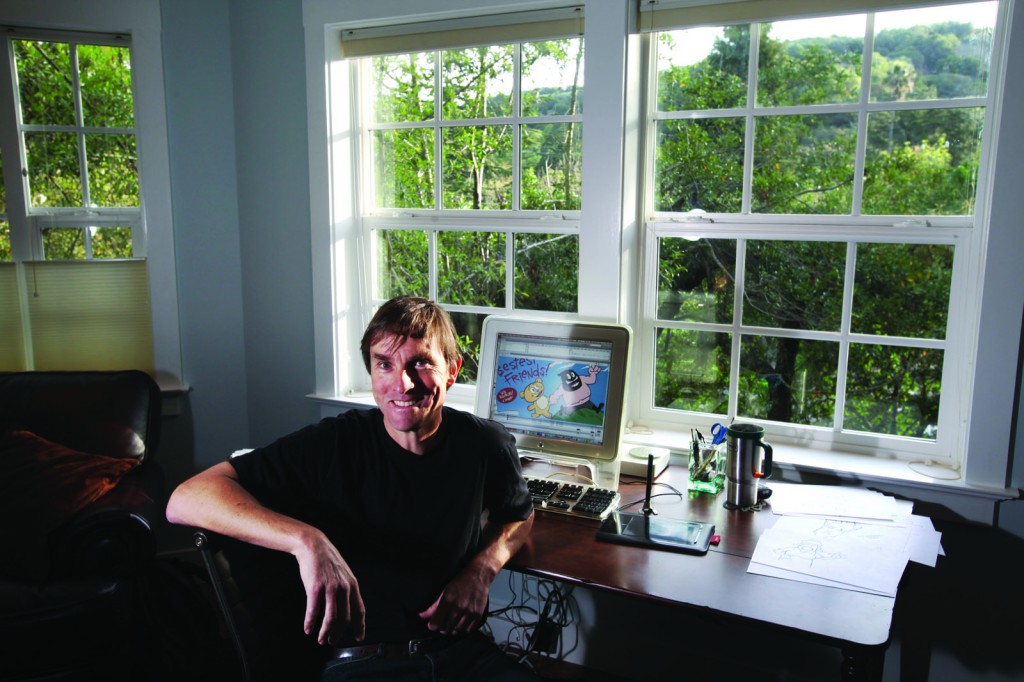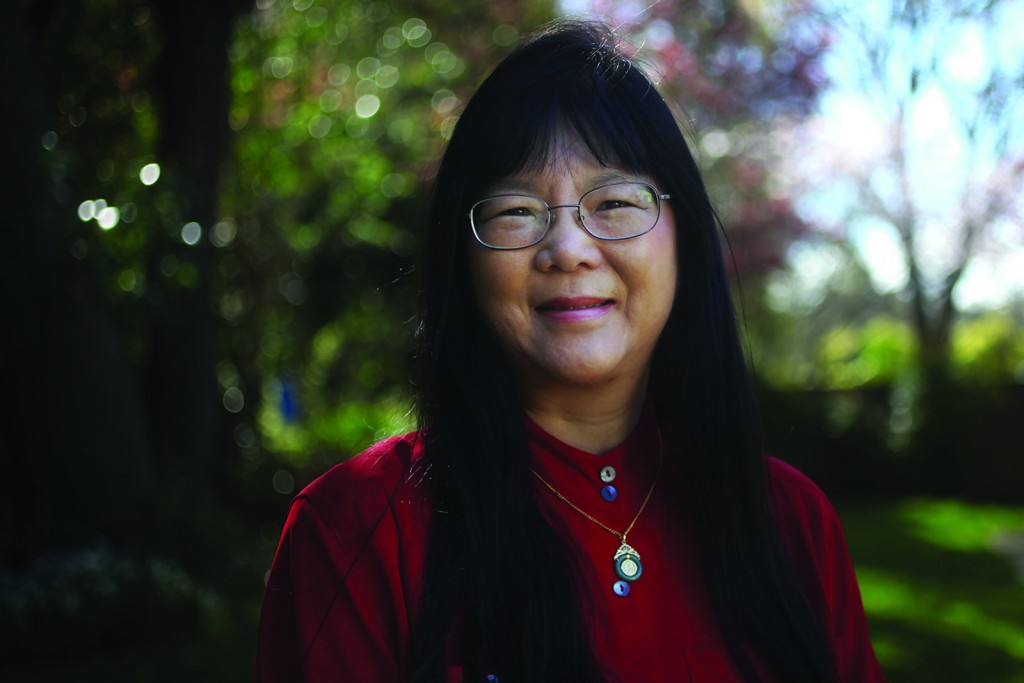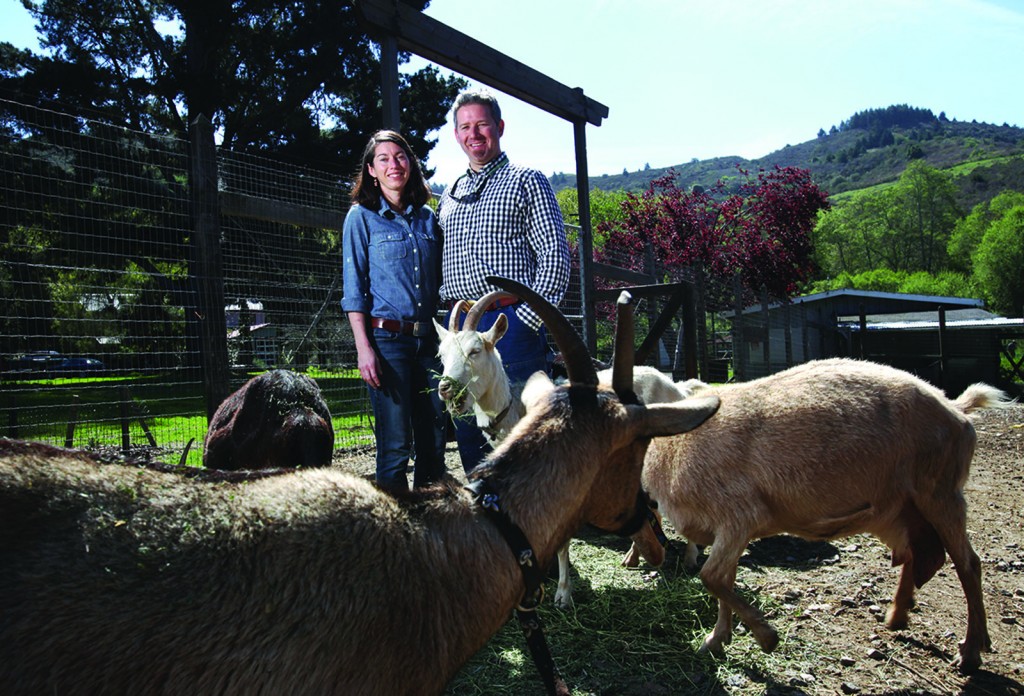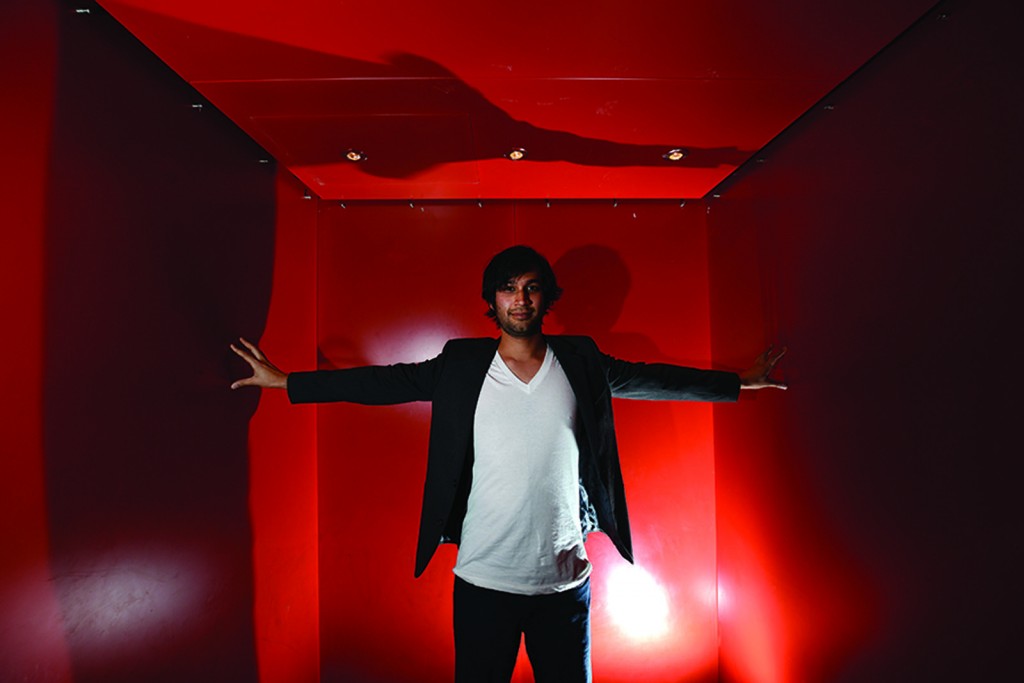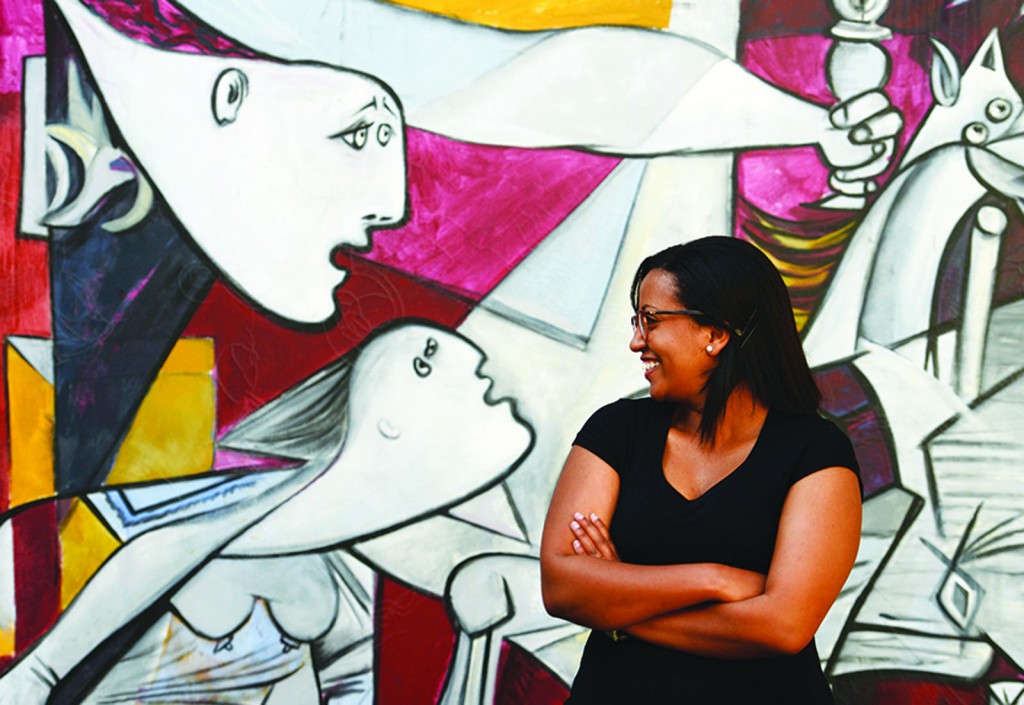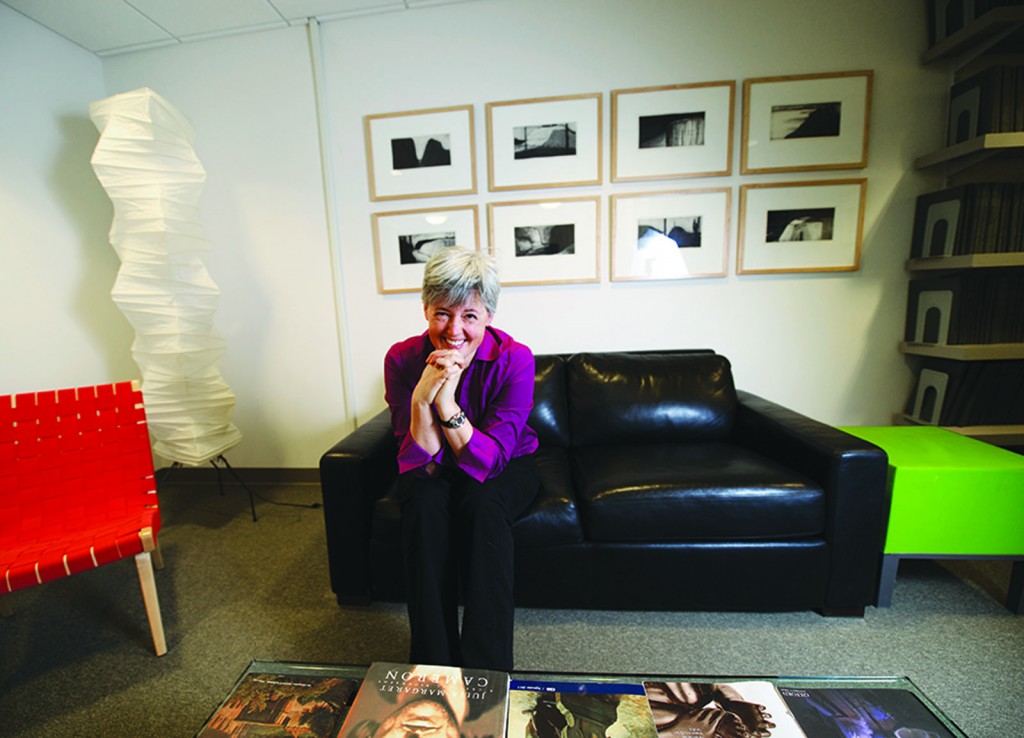They come from different eras and have taken divergent paths, but these outstanding and innovative members of the CC community express similar sentiments about what they do and how they maintain their momentum toward changing the world.
First and foremost, they all have passion for their life’s work and know that will keep them engaged and energized. Second, they have the willingness and courage to take the leap from dreaming to doing. Last, they admit what they don’t know and figure out how to gain that knowledge.
These are people who say “Why not?” and “What if . . .?” They’re people who see a need and devise a way to answer it, even if doing so takes them out of their comfort zone. In a way, CC planted the seeds — but it also gave them the wings.
These are CC’s Faces of Innovation for 2014.
Information: www.coloradocollege.edu/facesofinnovation
Connecting the World
Paul-Miki Akpablie ’16 grew up in Ghana, so he knows firsthand the communication problems inherent in sub-Saharan Africa. Ghana has an estimated 16 million mobile phone users, but more than 40 percent have no electricity to charge their phones; blackouts can last a week or a month. Charging stations are available, but can be time-consuming and expensive.These barriers deny access to what can be lifelines: for workers receiving payments for their goods and services, for young people yearning to broaden their education, for families caring for a woman in labor.
“A phone is a very big thing in Ghana; it’s not just a small device that you can toss around. It is something that is very powerful to people,” the mathematics and biochemistry major said.
Akpablie spent four years developing the technology to answer this need: the Ray20, a mobile phone charger that uses battery and solar energy to charge phones and other digital devices. The website for his company, Kadi Energy, says the Ray20 has two built-in 10,000 mAh, rechargeable Li-ion batteries. After 12 hours of sun, it can charge 14 phones (based on iPhone4) before needing a solar panel recharge. The device is 6.5 inches long and has four USB charging ports, and can hold a charge for up to six months. The Ray20, which costs $25, can be used in homes or communal charging stations.
Cell phones are just the beginning, though; Kadi’s management team plans to expand the technology to other life-changing products.
“Kadi Energy aims to bring innovative energy solutions and empower social change in Africa, starting with my home country of Ghana,” Akpablie said during The Big Idea pitch competition.
Information: www.kadi-energy.com
Trusting Yourself
Jennifer Cajina-Grigsby ’14 knows how to make research fun. The sociology major realized she could study London’s cultural melting pot through its restaurants, and won a Venture Grant to do it. Her study, “Immigration and Ethnic Diversity in the British Society: An Exploration Through Visual Sociology and Gastronomy,” also draws on the relatively new practice of using photography to chronicle social events.
“The thing that most inspired me to do this Venture Grant was the way to study this and at the same time, submerge myself in the culture. I feel that, in order to really take advantage of something, you really need to submerge yourself,” she said.
Cajina-Grigsby’s earlier Venture Grant research focused on the impact of tourism on developing countries, including her native Nicaragua. The dilemma: Tourists infuse much-needed revenue into a nation’s economy, but at what cost to the culture’s integrity? She applauded CC for the resources she was able to tap and the encouragement she received.
“We have funding, we have professors, we have staff. The staff members are absolutely amazing here. I have a really good relationship with a lot of them. And I think that you just have to go after it. If you have a project, an idea, you just have to go to a professor that’s going to help you make it real and give you the theory and the methods,” she said.
“I think that you just have to trust yourself and not think, ‘Oh man, this is not something that people are going to be interested in.’ Because if you’re interested, then you can make it interesting to people.”
Information: tourism-as-development.tumblr.com
Planting the Future
Who knew? There’s actually a company that manages the country’s largest portfolio of hardwood forests. That’s 3.6 million acres in 24 states, plus chunks in Canada and a few Caribbean nations.
No surprise: It was co-founded by a CC graduate, Charles “Chip” Collins ’77. He and several partners started The Forestland Group in 1995, partly to make money for investors. But it’s not just about the financial benefits.
“From Day One, when we started this process and started to build the company, we focused on a sustainable management strategy. Our goal was to maintain or even improve the ecological integrity of the forests that we buy.” The Forestland Group ensures that its forests include diverse species growing at different rates. This approach made TFG the first institutional timberland investor to earn green certification from the Forest Stewardship Council.
“I had grown up in the East and gone to school in the East, and when I went west, all of a sudden, I felt like the world sort of opened up to me. I realized that there was just a broad swath of things that you can do.”
His primary advice for future innovators? “Find something that you’re very passionate about and very interested in, because that makes your life so much happier and so much more interesting and fun if you can work on that for the majority of your career.”He also advises finding — or creating — a field that isn’t packed with potential competitors.
Collins’ final recommendation: “Having the ability to start something where you can really stay with it for long enough to make sure that it plays out is very, very important. Because if you are innovative and you’re focusing on a new field that other people have not really worked in before, it can take time to put it together.”
Information: www.forestlandgroup.com
Animating Passion
This is a whole new breed of cartoon, the work that Mark Fiore ’91 produces. His pointed, animated satires for the San Francisco Chronicle brought him a Pulitzer Prize in 2010 — the first time the prestigious award went to a non-print cartoonist. For him, it’s all about changing the world and how people think about it.
“The social impact that I’m trying to have with this work is really just to make a difference, as cheesy as it sounds. It’s something that led me to traditional political cartooning and journalism in general, but with the work that I do day in and day out, it’s really just doing work that you can be proud of and saying things that you want to say. And if you go further down the road, you’re trying to make the world a different place.”
Fiore, who was profiled in the August 2010 Bulletin, knew that he wanted to be a cartoonist when he arrived at CC. He pursued his love in art classes while majoring in political science — a potent combination that perfectly prepared him for this career.
“The liberal arts background trained me and gave me the tools to be able to take the twists and turns along the road. I didn’t ever call it ‘innovation’ then; nobody ever used the word ‘innovation’ when I was there. It was more just the idea of being well-rounded and figuring things out as you go. I think if you’re passionate about it, you have the tools from Colorado College to put into that passion and put into that career and path, and that’s going to help you incredibly.”
Take a look at his work on sfgate.com, but beware: “I feel like I’m peeling people’s skulls back and poking different parts of their brain,” Fiore said.
Information: www.markfiore.com
Crossing Borders
Margaret Liu ’77 knows a secret: Not only is your life more rewarding if you have various interests, a multifaceted approach can help you solve problems.
“It turns out, many discoveries come about by being at the interface of two different fields. And you bring a different perspective from each field to a particular arena of activity or of science or study that you’re involved with,” she said.
The Harvard-educated physician also studied piano at École Normale de Musique de Paris. Liu’s primary focus since 2002 has been her company, ProTherImmune. Its mission is getting medical care to people in poorer countries who don’t have access to clean water and health care. She develops new vaccines and technologies, then works with international groups to deliver them.
Since leaving Colorado, her resume includes being a senior advisor in vaccinology to the Bill & Melinda Gates Foundation, teaching at Harvard and the Massachusetts Institute of Technology, and practicing medicine at Massachusetts General Hospital. In 2002, the same year she received an honorary doctorate in science from CC, Discover magazine named her one of the 50 most important women of science.
So this is someone to listen to when she gives career advice. “Pursue your passion rather than trying to major in or pick a career in something that somebody else thinks you should do, or even that you think would be economically more stable.”
Liu urged students to seize every opportunity to gain real-life experience in their chosen field through internships and research positions. But she also put CC and her fellow graduates on notice. “This is actually a responsibility for the school, and for alumni as well, to try to make these sorts of experiences possible for you.”
Expanding Lives
How does milking goats provide life lessons for disadvantaged kids? Just ask Shawn Sears ’98 and Laura Dickerson Sears ’99, who founded Vida Verde in 2001. The camp south of San Francisco provides free outdoor experiences for fourth-, fifth-, and sixth-graders so they can see what the world offers beyond the Bay Area’s inner cities. Their “classrooms” include beaches, the redwood forest, and an organic farm, complete with those goats.
“It’s kind of like opening a mental door for them, we hope,” Shawn said. “Giving them the possibility to understand the different paths for themselves, to see people like our instructors who live a very different lifestyle than, I think, most of the people they’re exposed to in their day-to-day life.”
On paper, Shawn and Laura were not qualified: They’d never taken business classes or written a grant application.
“None of this stuff, we had no clue,” Laura said. “All we knew was that we wanted to take kids outdoors and that we wanted to help disadvantaged youth to have an equal footing. But we had all these tools in our toolbox we had learned” at CC.
Mostly, they want young people to tap into their imaginations and self-confidence, just as they have. “We’re always telling people, ‘Don’t be afraid to try this. If you have a dream, if you have an idea that you think is good, that you’re excited about, then there’s nothing to stop you from just trying it,’ ” Laura said.
“It’s not as hard as it seems, especially if you’re coming from a place like CC, where you’re so well-equipped without even knowing it, often. You’re so well-equipped to just make it up as you go along.”
Information: www.vveducation.org
Preventing Disasters
Ice cream may seem like a frivolous basis for a career, but not to Azeem Sola ’14. His family takes that dessert seriously: His father owns an ice cream franchise, and has lost up to $1,500 per year in products when refrigerators and freezers conk out. So, the computer science major devised a sensor that meticulously monitors temperature data and reports it via the Internet.
“From there, we can do all of these spiffy algorithms on that and basically predict when a fridge or a freezer might fail,” he said. “Hopefully, over time, we think that these are going to get better and better and basically, weeks before a fridge might fail, we plan on alerting: ‘There’s something going on here; you should really check this out. Get it maintained before you lose some of your products.’ ”
Sola built his company, Koldsnapp, around that practical invention.
He credits Patrick Bultema, executive director of CC’s Innovation Institute and the Big Idea Competition, with giving him the impetus and tools to take his creation to the next step. “The little Half Block 10-day class that he did changed my life in a lot of ways. It was so incredibly practical.”
Despite his youth, Sola knows how brainstorming works and how to carry ideas through to a workable, marketable solution. Sometimes, he said, his ideas hit a wall and he has to let go of them and think of something new.
“But other times, things really stick, and it’s those things that stick that seem to really work. It’s really more the drive and the passion and kind of this commitment to continuously be evolving and advancing and learning exactly what you need to be doing at any point in time, and doing that thing.”
Information: koldsnapp.com
Opening Minds
Math and science have always come easy for Beza Taddess ’15. Combine those abilities with her desire to help women and babies in poorer societies, and you have a leader in social justice. The native of Ethiopia spent last summer interning in Uganda and rejuvenating a hospital’s outreach program.
While she was there, the program reached about 350 people and, she said, it’s still going strong.
As she worked with community leaders to spread acceptance of family planning and prenatal care, she learned lessons about global sustainability and effective, respectful ways to enlighten others.
“When you go into a community, you already believe that you can help, and you kind of go in with your own goals and your own preconceived ideas how things should run. But I think, if you want to be an innovator, you should go in there with an open mind and then move from there.”
Taddess calls it a 50-50 relationship: The visitor must be open to learning from the community, or the experience could drain energy and enthusiasm.
“I think you should go into a community with the idea that you’re going to learn something and you can help with something. And I think go in there with an open mind that there are opportunities for you to tap into your interests, but also you need to keep in mind the needs of the community.”
She appreciated the support of CC’s Sociology Department, especially being able to talk with her professors about her interests and hear their ideas for resources to further her knowledge — even when they weren’t in the classroom.
“It was really nice to take what I was passionate about and then bring it in the classroom setting.”
Reinventing the Gallery
No more leafing through dusty tomes or yawning through slide shows — Rebecca Tucker’s art history students handle actual objects and learn about the individuals and culture that formed them, then see their visions come to life in CC’s IDEA Space. Tucker, who taught as a CC visitor in 1995 and joined the staff in 2003, played a key role in the genesis of the Cornerstone Arts Center gallery.
“We had to think about how to make a gallery setting responsive to the Block Plan and integral to the way we teach. We said, ‘OK, how can we make the gallery part of the classroom, the way that we take the mountains and make them part of the classroom for geology, or the local environment for sociology, for community-based learning? How do we take a gallery and turn it into some kind of learning opportunity?’ Not just to go in there and see something and say, ‘Oh, that’s pretty,’ but to engage with what happens when you show something.”
Tucker curated “Devotional Cultures: Spanish Colonial Art in the Southwest,” which ran Jan. 20-March 8 this year in IDEA Space. That exhibit drew almost 1,000 visitors, nearly 300 from CC classes ranging from religion and history to anthropology and sociology.
“With much credit to Jessica Hunter-Larsen, who’s the curator there, I would say it’s been a tremendous success, one of the most visible and innovative parts of Cornerstone.”
For a few moments, she mentally dropped into a world of plain white boxes full of apathetic art.
“Let’s face it, the art gallery is for the art department, right? They put up stuff they like, they take their students, people stop in once in a while. But it’s not like a campus hub or anything, true? Not here,” she said, shaking her head.
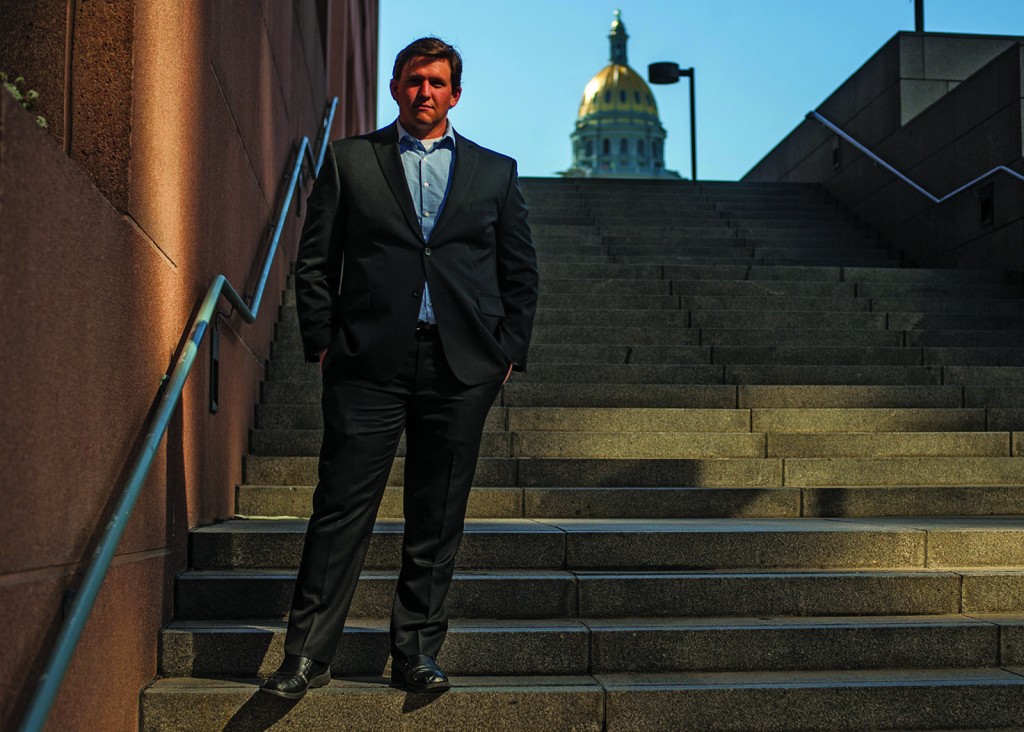
Navigating Healthcare
For Matt Valeta ’12, healthcare reform is not just a talking point in debates about the government’s role in our lives. For him, it’s an every-day-in-the-trenches type of commitment to ensuring that everyone has access to healthcare.
Through his job as health policy fellow and consumer advocate at the Colorado Consumer Health Initiative, Valeta helps Coloradans navigate all the moving parts — providers, insurers, and others — that make up today’s healthcare system. He got his foot in the CCHI door through his Public Interest Fellowship Program internship.
“I really enjoy being able to provide a voice for consumers in places like the Capitol so that all these different changes we’re making to the healthcare system, bottom line, work for them and help them get the care that they need when they need it. It’s really important to me, personally, that healthcare is not something that people have to struggle to get, but that’s available to everyone. It’s something that we’re all going to need at some point so I think we should commit to making sure that everyone is able to access it.”
CC and the Block Plan gave Valeta the skills to compile information quickly (such as writing a 10-page paper overnight), organize it logically, and present it coherently — all talents that come in handy in his career.
“The thing I really appreciated about my time at CC in college was that you had a space to make mistakes and to learn and kind of develop the skills that you’re going to need to be part of whatever world you want to be in.
“More importantly is, I think, how to know what questions aren’t being asked yet. Basically, where are the answers missing and how do we get them? That kind of critical thinking process and knowing how to continue to dive deeply into issues is something I’ve really taken from CC and applied to my job.”
Information: cohealthinitiative.org
